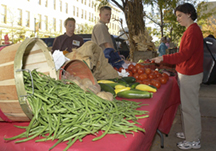
February 9, 2005
Organic ag market shows promise for profit
WEST LAFAYETTE, Ind. - Farmers looking for ways to increase profits may find organic crop production a profitable move, according to a Purdue University Cooperative Extension ag economist.

|
"Nationwide, the market for organics is growing at 20 percent per year," said Corinne Alexander. "It's the fastest growing food area."
According to the 2002 U.S. Department of Agriculture Census of Agriculture, American farmers used 562,486 acres to produce more than $392 million worth of certified organic crops. Indiana farmers used 1,419 acres of land to produce approximately $851,000 in organic products - an average of $600 per acre. Traditional farming averaged $318 per acre in sales for the same year.
Alexander cautioned that costs even out many of the differences, because organic production is more expensive.
"A lot of time and labor is substituted for chemicals," Alexander said. "It's also a lot more risky. If you end up with a pest infestation or weed problem, it can be serious because you don't have the chemicals to control it."
Organic products are made without the use of synthetic pesticides and fertilizers and organic livestock is fed organic feed, grazed on organic pasture and slaughtered in an organic facility.
Gary Reding of Greensburg, Ind., is transitioning some of his acreage into organics.
"Rather than producing a commodity and then hoping I get to sell it, I'd rather produce a specialty item that the consumer wants," he said.
Reding is part of the New Ag Network, a collaborative effort among Purdue, Michigan State University, the University of Illinois and Iowa State University, that serves producers who are interested in moving to organics or low-input agriculture.
The network also includes organic farmers, like Reding, from all four states. The producers work with Extension educators and record their experiences during the growing season.
"If there's a problem we discuss it," Reding said. "There's no need to reinvent the wheel."
Cissy Bowman is an organic farmer and executive director of Indiana Certified Organic LLC, the only organic certification organization based in Indiana. She knows the highs and lows of organic production. The USDA regulates organic labeling, and for a producer to sell organic products, their production equipment, facilities and land have to be certified organic.
"People need to start thinking about getting certified two years out," Bowman said. "You don't want to wait until you have a crop to sell to get certified."
For land to be certified for organic production, it must be free of synthetic chemicals for at least three years. Organic animals also must be fed and maintained organically.
Even with the risk and increased costs, Alexander still thinks there's room for growth in the organic market.
"There is a large demand out there that's not being met," she said.
Writer: Kay Hagen, (765) 494-6682, kjh@purdue.edu
Sources: Corinne Alexander, (765) 494-4249, cealexan@purdue.edu
Gary Reding, (812) 663-9546
Cissy Bowman, (317) 539-4317, cvof@iquest.net
Ag Communications: (765) 494-2722; Beth Forbes, forbes@purdue.edu
Agriculture News Page
PHOTO CAPTION:
Corinne Alexander (at right), an assistant professor of agricultural economics, is an organic consumer because the farmer is able to receive a larger share of her food dollar. Alexander says organic producers like Dona Filbrun (at far left), who owns Garden of Eden and markets her homegrown produce at the Lafayette Farmer's Market, also earns a higher price for organic produce. (Purdue Agricultural Communication photo/Tom Campbell)
A publication-quality photo is available at https://ftp.purdue.edu/pub/uns/+2005/alexander.organics.jpg
To the News Service home page